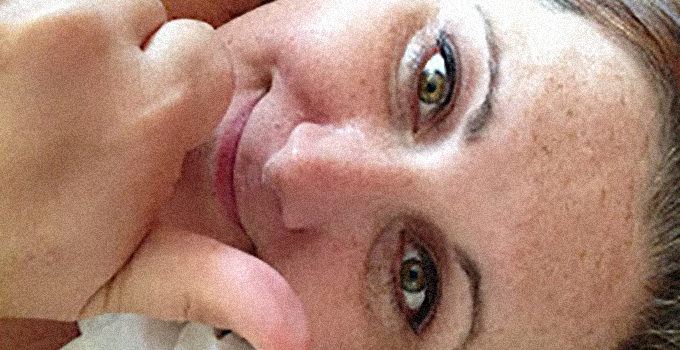

PATIENT STORY: A Tale of Two Cushing’s Surgeries
by Zara Jethani
Rae lives on a 9000 acre ranch in Northern California, is a wife, a mother of four teenagers and is in remission after the removal of pituitary tumors which caused her to develop Cushing’s Disease.
Rae grew up as an Army brat and went to 22 countries before she was 20 years old. She says, “It was an adventure that I wish now I would of paid more attention to. We lived in big cities like Tokyo, Japan and Munich, Germany. Stateside we were always in big cities too. Funny how I should end up in a town of 250 people.”
 Life was quite normal until a little over 5 years ago, when she first started noticing unusual symptoms – she wasn’t sleeping at night and began gaining weight. Rae knew something was wrong but remained undiagnosed by the clinic in her town. Her symptoms worsened, “I had gained 120 pounds in 2 years. By now my symptoms were weight gain, muscle loss, stretch marks, big stomach, thin legs, bruising, days of insomnia, my blood pressure was now high, anxiety, depression, loss of hair on my head, chin hairs I plucked daily, constantly tired, buffalo hump on my back, fat clavicles and I was sick all the time.” She decided to go to the clinic in the next town, where the doctor said, “I think you might have Cushing’s. It’s really rare though so let’s get you tested.” An estimated 10-15 per million people are affected every year.
Life was quite normal until a little over 5 years ago, when she first started noticing unusual symptoms – she wasn’t sleeping at night and began gaining weight. Rae knew something was wrong but remained undiagnosed by the clinic in her town. Her symptoms worsened, “I had gained 120 pounds in 2 years. By now my symptoms were weight gain, muscle loss, stretch marks, big stomach, thin legs, bruising, days of insomnia, my blood pressure was now high, anxiety, depression, loss of hair on my head, chin hairs I plucked daily, constantly tired, buffalo hump on my back, fat clavicles and I was sick all the time.” She decided to go to the clinic in the next town, where the doctor said, “I think you might have Cushing’s. It’s really rare though so let’s get you tested.” An estimated 10-15 per million people are affected every year.
Endocrine tests showed only slightly elevated cortisol hormone levels, an indicator of Cushing’s Disease. Rae got in touch with another endocrinologist in Los Angeles, who reviewed her case and placed her on ketoconazole. After two months, her symptoms were not resolving, so he decided to recommend surgery at an out of state medical center.
 “In July 2014, I had my first of two pituitary surgeries. They found two tumors and took them out. By then, they were 4mm and 5mm and within a couple weeks was told I was in remission.”
“In July 2014, I had my first of two pituitary surgeries. They found two tumors and took them out. By then, they were 4mm and 5mm and within a couple weeks was told I was in remission.”
For a while Rae felt better, but her hormonal levels during recovery were not as they should have been and she found that her earlier symptoms were beginning to return. “Month 8 post op I knew I wasn’t in remission. I had been telling myself that it’s probably day to day stress of getting my four teens everywhere they needed to be. That’s why I am not sleeping. I started gaining weight again. My blood pressure was now sky high. I knew in my heart I wasn’t in remission anymore. I told my husband but he didn’t want to believe it either. Who would, right? By month 9, I went back to the endocrinologist to retest. Every single test I took that week came back high. Some sky high. I cried. I cried and cried and cried. Surgery was set again. I knew more this time so I wasn’t as scared.”
But at the last minute, Rae’s insurance company told her that they could no longer cover out-of-state procedures. She was devastated, but resolved to find a neurosurgeon in California. She found Daniel F. Kelly, MD, at the Pacific Brain Tumor Center. “I contacted him directly and told him what had just happened – that I had a diagnosis and this was my second surgery. He wanted me to see his endocrinologist, Dr. Pejman Cohan. Dr. Cohan’s bedside manner was amazing and in just one appointment I learned more than I had in a while.”
“I spent that whole week getting tested and seeing Dr. Kelly and his staff. He wanted to give me his own diagnosis – if Dr. Cohan also decided I had Cushing’s. They did everything within their own trusted staff which I liked. Dr. Kelly was amazing. Very knowledgeable and when he looked at me he said that I look like a person with Cushing’s. He looked at every lab and every detail of my surgery from before.”
Rae was scheduled to have surgery a week later, on October 1, 2015, “I knew I was in great hands. Dr. Cohan had even told me that after this surgery I should be in remission as I literally had the two best surgeons in the country. If I didn’t go into remission though we would have other options. I had a 50/50 chance with remission my second surgery. I knew it, they knew it, but I had hope.”
After surgery, Dr. Kelly and team monitored Rae’s cortisol levels and did a follow-up MRI within 24 hours to make sure all of the tumor had been removed.
In December, about two and a half months post op, Rae reported, “I’ve lost 19 pounds, gained muscle, my blood pressure for the first time in a long time is normal. I am not pre-diabetic anymore. My hair is growing back. I have not bruised at all. My mood is better. I don’t feel depressed or have massive anxiety. I am exhausted all the time as I am recovering but I sleep every night – all night long. Things are looking up.”
Thank you Rae for sharing your story.
Established in 2000, Pacific Pituitary Center’s pituitary patient support group is the longest running pituitary patient support group nationwide. If you are interested in finding out more, contact our patient advocate, Sharmyn McGraw.
About the Author

Zara Jethani
Zara is the marketing director at Pacific Neuroscience Institute. Her background is in molecular genetics research and healthcare marketing. In addition, she is a graphic designer with more than 20 years experience in the healthcare, education and entertainment industries.
Last updated: May 3rd, 2022